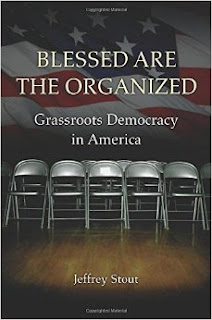Blessed, indeed, are the Organized
I may have a new first book to recommend to folks about the nature of community organizing. Often, I suggest Dennis Jacobsen's Doing Justice: Congregations and Community Organizing as a first book to read. I once kept a small box of Jacobsen's book in the car to give to key people when we were trying to build an organization in South Bend, IN. This weekend, I finished reading Jeffrey Stout's Blessed are the Organized: Grassroots Democracy in America, the likely replacement to Jacobsen's fine work.
To begin with, I love the title: Blessed are the Organized. Invoking the Beatitudes gives a pithy, novel explanation to the purpose of organizing. The Beatitutdes, as spoken by Jesus and related in the Gospels, tells of a "blessing" given to those who, for their current condition, appear more bereft than blessed. We organize that our lives might know a blessing that we do not currently experience. The book derives its form from the fortuitous suggestion of Stanley Hauerwas, a theologian at Duke University (and a personal favorite), that Stout meet Ernie Cortés. In typical, salty Hauerwas fashion, referring to the IAF organizers, Hauerwas quipped, "they'll kick the shit out of you" (293).
Blesses are the Organized, then, is the fruit of spending considerable time with the Industrial Areas Foundation in the West and Southwest of the U.S. The IAF, founded by Saul Alinsky in the 1940s, is the nation's largest and longest-standing network of local faith and community-based organizations. Stout's text provides wonderful stories from organizers and leaders, explanation of the foundational elements of organizing, references from Alinsky and the history of organizing, and reflection on the nature of democracy and grassroots democracy. In other words, while this book will introduce a reader to the concepts, practice, and history of organizing, an advanced reader will not be disappointed. Stout engages in significant consideration of philosophical issues related to democracy and organizing as well.
Since 1975, Stout is a professor of religion at Princeton University. A member of the Department of Religion, Stout is associated with the departments of Philosophy and Politics and with the Center for the Study of Religion and the Center for Human Values. Interested in film as well, Professor Stout seems to pursue a wide-array of interests. Those broad interests are well-utilized in creating this important book.
To begin with, I love the title: Blessed are the Organized. Invoking the Beatitudes gives a pithy, novel explanation to the purpose of organizing. The Beatitutdes, as spoken by Jesus and related in the Gospels, tells of a "blessing" given to those who, for their current condition, appear more bereft than blessed. We organize that our lives might know a blessing that we do not currently experience. The book derives its form from the fortuitous suggestion of Stanley Hauerwas, a theologian at Duke University (and a personal favorite), that Stout meet Ernie Cortés. In typical, salty Hauerwas fashion, referring to the IAF organizers, Hauerwas quipped, "they'll kick the shit out of you" (293).
Blesses are the Organized, then, is the fruit of spending considerable time with the Industrial Areas Foundation in the West and Southwest of the U.S. The IAF, founded by Saul Alinsky in the 1940s, is the nation's largest and longest-standing network of local faith and community-based organizations. Stout's text provides wonderful stories from organizers and leaders, explanation of the foundational elements of organizing, references from Alinsky and the history of organizing, and reflection on the nature of democracy and grassroots democracy. In other words, while this book will introduce a reader to the concepts, practice, and history of organizing, an advanced reader will not be disappointed. Stout engages in significant consideration of philosophical issues related to democracy and organizing as well.
Since 1975, Stout is a professor of religion at Princeton University. A member of the Department of Religion, Stout is associated with the departments of Philosophy and Politics and with the Center for the Study of Religion and the Center for Human Values. Interested in film as well, Professor Stout seems to pursue a wide-array of interests. Those broad interests are well-utilized in creating this important book.




Comments
Post a Comment